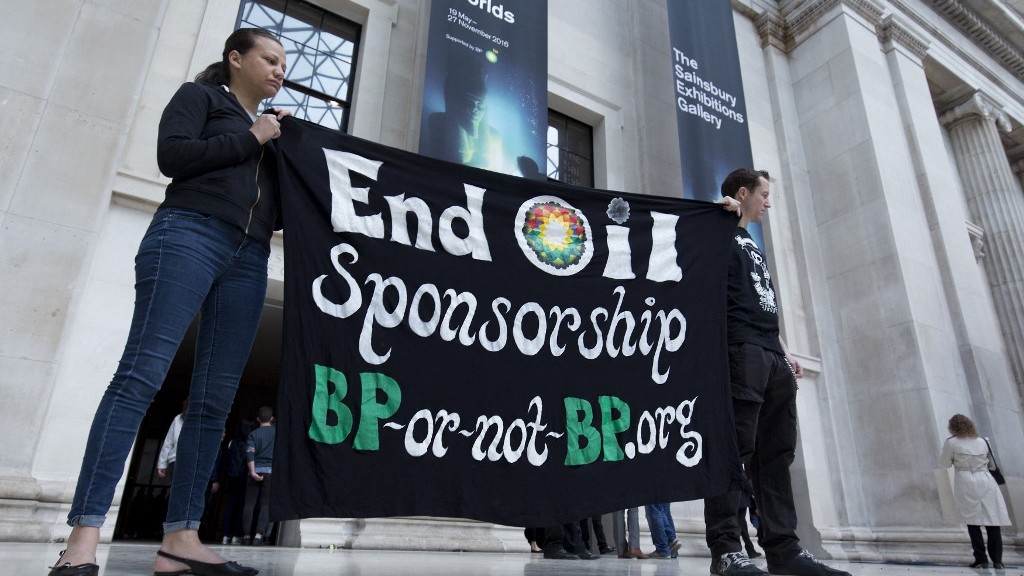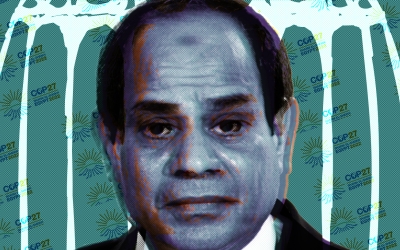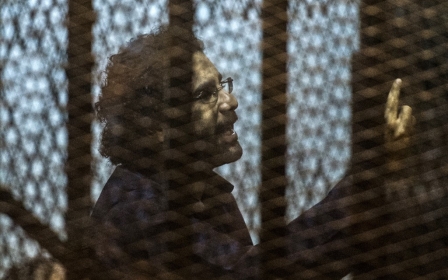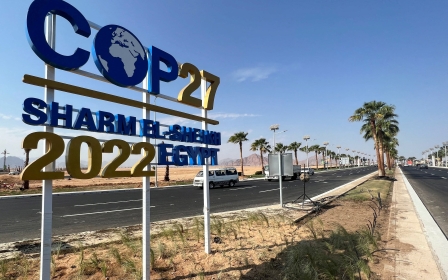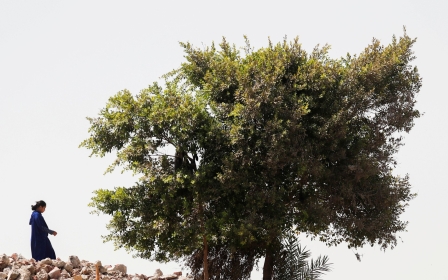Cop27: How Egypt and the oil industry are silencing calls for climate justice
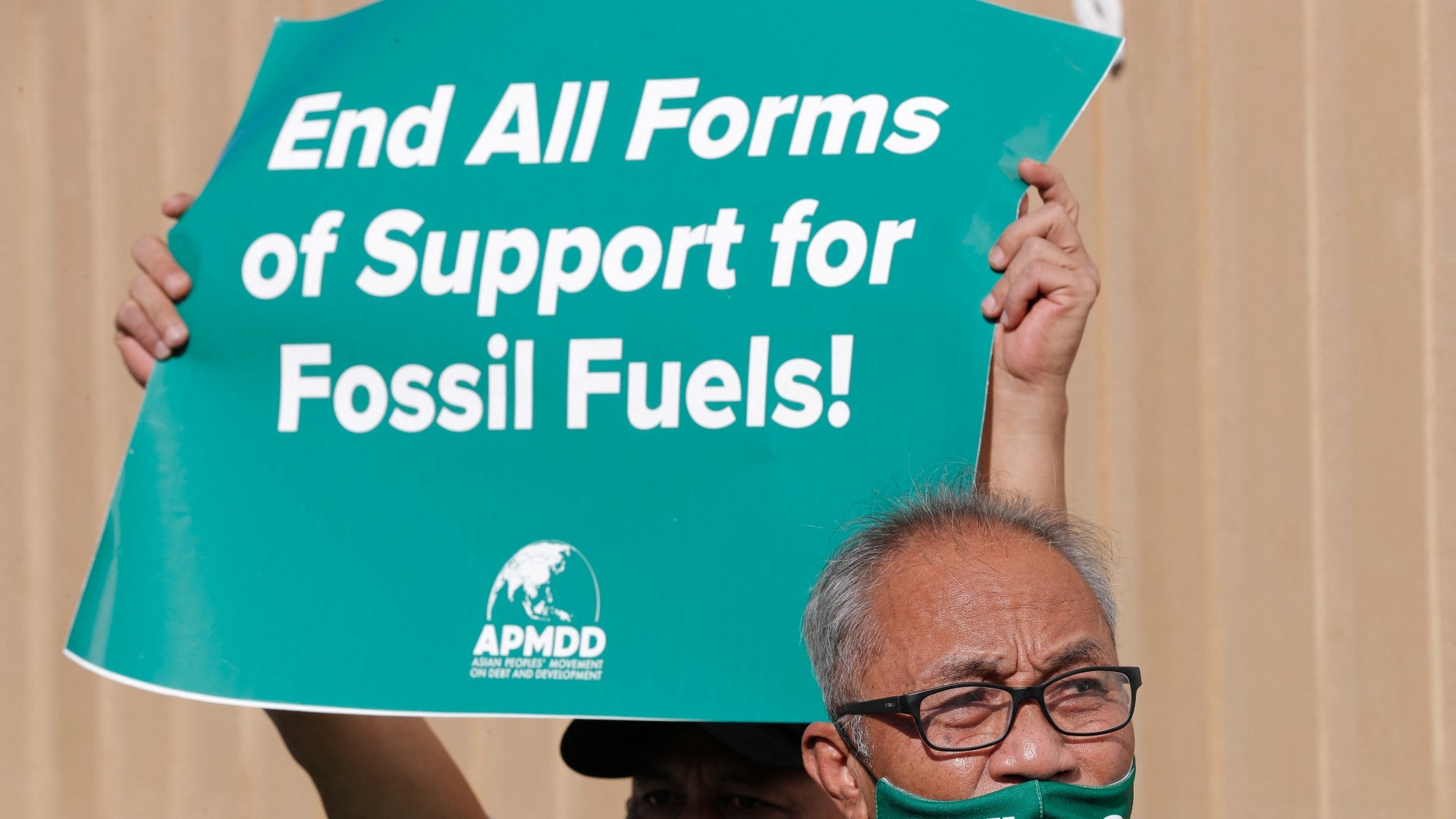
"Why are you trying to choke me? You’re putting your hands around my neck and trying to choke me. You’re choking me and telling me you’ll be giving me a new pair of shoes?”
These were the words of a resident of Idku, Egypt, at a public hearing in May 2011 on plans by British Petroleum (BP) to build a gas terminal on the town’s land. Idku is a small fishing community perched where the Nile Delta meets the sea.
'People saw a relationship between extraction of fossil fuels on their doorstep, and not being able to continue their existing livelihoods'
- Activist Mika Minio-Paluello
Inextricably connected with the water and the land, the community is vulnerable to the impacts of climate change - and it could disappear altogether as the sea level rises.
The fishers and farmers who work here feel this interdependence deeply, having seen their water and land poisoned by sewage canals and petroleum plants. Fishers interviewed by the Mosireen collective in 2013 revealed a keen awareness of this connection: “Since they’ve sunk those boulders into the sea and built those factories and buildings, the fish have clustered to the boulders; so we in turn are forced to go to those rocks, and the pipes from the factories destroy our nets.”
When in 2011, in the heady aftermath of Egypt’s 18-day uprising, BP planned the construction of a gas terminal in Idku as part of an $11bn project, the community’s resistance was fierce. The planned station was to include more subsea pipelines, squeezing fishers’ boats into an ever-shrinking area.
New MEE newsletter: Jerusalem Dispatch
Sign up to get the latest insights and analysis on Israel-Palestine, alongside Turkey Unpacked and other MEE newsletters
But the timing was fortuitous: the occupation of Tahrir Square had wrenched open a window for self-expression, allowing communities such as Idku to manifest their anger publicly. People sprayed graffiti on buildings and hung anti-BP banners from balconies. A mock funeral procession saw a coffin symbolising Idku’s land carried through the streets. Public anger also spilled over into direct action, as residents stormed BP’s offices and confiscated computers, something unimaginable under the current Egyptian regime.
The blistering public fury ultimately pushed BP to relocate the gas project to a neighbouring region.
Crushing resistance
“People saw a relationship between extraction of fossil fuels on their doorstep, and not being able to continue their existing livelihoods,” Mika Minio-Paluello, an activist who supports community resistance to oil and gas projects, told Middle East Eye.
Although the space for meaningful organising was limited before the 2011 Arab Spring, once the uprisings broke out, “people in lots of countries - Egypt and Tunisia and Syria and Algeria - got in touch, saying now we’ve got the space to organise against and fight against the destruction caused by your BPs and your Shells,” Minio-Paluello said.
While Minio-Paluello worked to support struggles such as the Idku fight and campaigns against fracking in Egypt, the window for this kind of work slammed shut after President Abdel Fattah al-Sisi took power in 2014.
Although the space for meaningful organising was limited before the 2011 Arab Spring, once the uprisings broke out, “people in lots of countries - Egypt and Tunisia and Syria and Algeria - got in touch, saying now we’ve got the space to organise against and fight against the destruction caused by your BPs and your Shells,” Minio-Paluello said.
While Minio-Paluello worked to support struggles such as the Idku fight and campaigns against fracking in Egypt, the window for this kind of work slammed shut after President Abdel Fattah al-Sisi took power in 2014.
Today, an anti-protest law threatens hefty prison sentences for street demonstrations, while the country’s investment law makes foreign deals less vulnerable to legal disputes. BP is now developing a $12bn gas project in the Mediterranean Sea, touted in 2015 as the largest foreign direct investment Egypt had ever seen.
According to Minio-Paluello, the heavy-handed state could suppress resistance to struggles against environmental damage - which may ease BP's developments.
BP has in the past worked with repressive regimes. The company boasts of its historic role in the Egyptian energy industry, investing more than $35bn over six decades. The company flourished under decades of autocratic rule, investing billions into fossil-fuel infrastructure during the Mubarak era, as revenue payments allowed the regime to bolster police and military forces. Rampant privatisation and crackdowns on dissent enabled untrammelled drilling in the Red Sea.
Middle East Eye reached out to BP for a response and received the following statement via email: "BP has been operating in Egypt for almost 60 years supporting Egypt’s growing demand for energy, and are one of the largest investors into its energy industry. BP operates around the world, working with partners, governments and communities to contribute to sustainable growth, create jobs and invest in people."
Last night, as the @britishmuseum hosted the VIP opening for its BP-sponsored #HieroglyphsExhibition, we projected the words #FreeAlaa onto its iconic building! 🏛️
— Culture Unstained (@Cult_Unstained) October 12, 2022
We urge the Museum to not just celebrate Egypt's past, but to speak up for #humanrights ahead of #COP27. pic.twitter.com/ALgP9j6KpQ
Today, under Sisi, BP controls close to 60 percent of Egypt’s gas production, ballooning from 30 percent in June 2017. Its foothold in Egypt is bolstered by its investments in cultural institutions in the UK, burnishing both the regime’s and BP’s image abroad. In the run-up to Cop27 in Sharm el-Sheikh, the British Museum opened its blockbuster BP-sponsored exhibition, Hieroglyphs: Unlocking Ancient Egypt.
The oil company states: "BP has supported the British Museum for over 25 years – this has included supporting around 20 special exhibitions as well as displays and touring exhibitions, covering a wide variety of subjects."
The exhibit’s opening night was crashed by activists from a group called Culture Unstained, who projected the words “Free Alaa” onto the museum’s grand facade, referencing high-profile Egyptian political prisoner Alaa Abd el-Fattah.
An open letter to trustees signed by dozens of activists highlighted the museum’s role in endorsing a dictatorship and the oil giant it partnered with: “As the Museum puts Egypt in the spotlight it has both a position of influence, and the responsibility to use it. It should not celebrate Egypt’s cultural past while ignoring the human rights situation in the present, or the climate impacts Egypt faces in the future.”
According to Sarah Waldron, a campaigner with Culture Unstained, the museum has refused to make any comment about the situation of political prisoners, claiming it has a duty to be "politically impartial". "This is frustrating, as it is exactly the issue that we raised: that its silence is not a neutral position when it has actively assisted the Egyptian government and its corporate partners with their efforts to gain legitimacy," Waldron told MEE.
Slipping into the sea
A previous BP-sponsored exhibition at the British Museum, Sunken Cities: Egypt’s Lost Worlds, in 2016 explored “the power of science and the pioneering spirit to discover what lies beneath the surface of the Nile Delta,” according to a company executive.
“BP was talking about itself as a fellow explorer of the deep,” Waldron said. The exhibit focused “shamelessly on sunken cities”, even as Alexandria itself was quietly slipping into the sea.
The British Museum also houses the Rosetta Stone, stolen from Rashid, a port city of the Nile Delta. “There are all these parallels in terms of extraction, with the stone having been taken from that area and all of the calls for that to be returned to Egypt, and then BP pumping gas literally a few kilometres down the road,” Waldron said.
Back in 2011, as fierce political debates unfolded in Tahrir Square, Minio-Paluello recalled a very different type of conversation taking place just down the street in Cairo at a meeting between NGO staff and professionals working in the sustainability sector. The offices were sponsored by German funding for small business and entrepreneurialism which influenced the framing of this debate.
"It was an extremely depoliticised conversation … They were not talking about dramatic changes, especially not in the context of international relationships, whether it be about BP or the influence of the West,” Minio-Paluello said. “There were a lot of people in that room who didn’t want to talk about the revolution.”
The gulf was stark between this discussion and the battle for land and water that was happening in Idku. While activists in Idku might not have used the term “climate justice”, they were nonetheless weaving connections between gas production, emissions and rising sea levels.
In the interviews recorded by Mosireen, one Idku resident said of the 2011 opposition to BP’s project: “If this plant had been built … nobody would have been able to breathe. They say the plants would have died; well, if it was going to kill the plants, what would have happened to the people?”
The voices of communities such as Idku will not be heard at Cop27. The venue, a walled beach resort in Sharm el-Sheikh, along with surveillance and intimidation of activists by the regime, will ensure they can’t get near it. It will take another Tahrir to allow them enough space to fight to keep their lives from slipping into the sea.
The views expressed in this article belong to the author and do not necessarily reflect the editorial policy of Middle East Eye.
Middle East Eye delivers independent and unrivalled coverage and analysis of the Middle East, North Africa and beyond. To learn more about republishing this content and the associated fees, please fill out this form. More about MEE can be found here.



